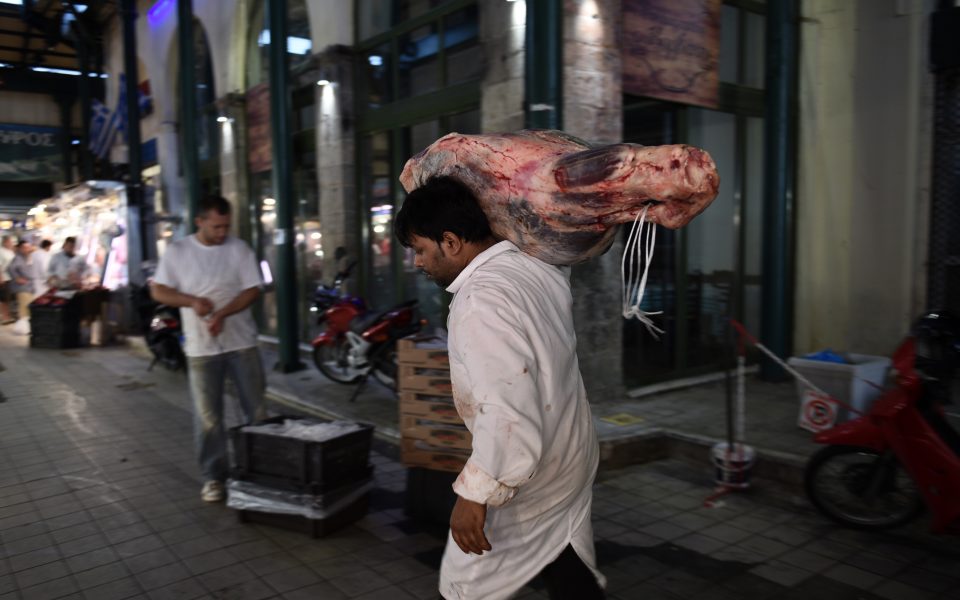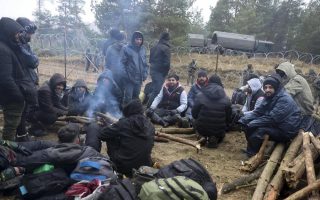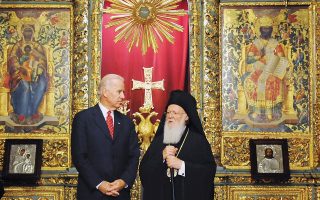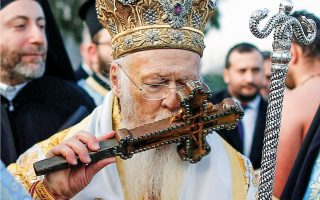Greek court ruling on ritual slaughter sparks debate over rights of religious minorities

Sitting beside his butcher block at the Varvakeios market in downtown Athens, Alaa Elkobtan plays a cellphone video of himself bottle-feeding water to a lamb. A few seconds later, he slits the animal’s throat with a knife.
“I give it some water to calm it down. It’s important for the animal. God created animals for us. But animals also have a soul, and that soul needs to be at peace when they go so that this kindness comes back to us,” says the Egyptian butcher who moved here from Alexandria in the mid-1990s and goes by the nickname Aladdin.
According to halal practice, whose basic principles are found in the Quran, an animal must be alive and healthy before a Muslim performs the slaughter while reciting a prayer dedicating it to God.
Halal, which means “permissible” in Arabic, “is like a key,” Aladdin says. “When I say ‘bismillah’ (in the name of God), the animal relaxes and tells me to slaughter it. Invoking the name of God is a lot like anaesthetic at the dentist. I do not believe that the animal feels pain,” he says.
During the process, the animal’s jugular vein, carotid artery and windpipe are severed in a single swipe with a sharp knife. All blood must be drained from the carcass.
Aladdin sells locally produced halal lamb and goat meat, and imports certified halal beef from Spain and France. Halal products, he says, are tastier as well as healthier than non-halal because the method optimizes bleeding out and diminishes meat defects. “Many customers prefer halal meat simply because it’s better quality,” he says.
A recent ruling by the Council of State, Greece’s top administrative court, could spell the end of the killing of conscious animals, dealing a blow to the Muslim custom of halal. A potential ban would also affect the kosher method of slaughtering animals in accordance with traditional Jewish law. Shechita, performed by a specially trained shochet at an approved abattoir, does not require prayer before the animal is slain.
With the exception of Muslim and Jewish communities, the slaughter of conscious animals was largely discontinued over the previous century. Also due to pressure from animal rights campaigners and secular-minded groups, consumers normally expect their meat to have been slaughtered in the customary Western style, whereby abattoirs use electrical stunning, captive-bolt stunning or carbon dioxide gas (CO2) to render the animal unconscious first. According to an opinion poll published a year ago, 89 percent of EU citizens said stunning should be mandatory before slaughter.
Aladdin disapproves. “Stunning is like bashing someone over the head on the street and then slaughtering them. The animal can, in fact, see what is happening,” he says. In his eyes, attacks on halal smack of hypocrisy.
“The truth is that the spectacle bothers their eyes,” says Aladdin, whose butcher shop has several times been spray-painted with Islamophobic slogans.
Fresh ruling
In 2009, the European Union introduced legislation designed to safeguard animal welfare at the time of slaughter. While green-lighting ritual slaughter provided that this takes place in an approved abattoir, Article 26 (2) of Council Regulation No 1099/2009 states that national governments may adopt “more extensive animal welfare rules.” A joint ministerial decision by the Greek government in 2017 went on to allow religious animal slaughter without stunning. However, following an appeal by animal welfare activists, the Council of State last month ruled that the 2017 decision had failed to duly balance animal welfare with the freedom of religion, and referred the matter to the competent legislative authorities.
The dispute is seen as typical of the issues raised by cultural relativism and diversity, multiculturalism and social integration – and the laden term of identity politics.
Vassilis Tzevelekos, senior lecturer in law at the University of Liverpool, explains that the judicial balancing required by the Council of State in the animal slaughter case “is not a dry, mechanical legal exercise.”
He describes it as an intellectual process involving value judgments that reflect moral, philosophical and political preferences, possibly prioritizing certain – likely dominant – values over other, conflicting ones. “Ultimately, multiculturalism is a political issue – not, strictly speaking, a legal one,” he says.
Reactions
Natasa Bobolaki, the president of the Panhellenic Animal Welfare and Environmental Federation (PFPO), an umbrella organization for 76 groups which submitted the appeal against the 2017 ministerial decision, has no qualms about the ethical considerations involved. “It’s an extreme form of torture,” she says of non-stun slaughter.
Bobolaki hails the recent court ruling and vows to fight against any renewed bid to upend it. She expects that “most pressure will come from the Israeli lobby.”
The Central Board of Jewish Communities in Greece (KIS) was quick to react to the court decision. In a statement, it slammed the ruling as “a strike against the right of the Greek Jews to freely practice their religion and observe the traditions of Jewish faith.”
“Keeping a kosher diet is an integral part of Judaic law; it has been observed for centuries and its banning would constitute a heavy blow to the Jewish way of life,” KIS said, urging the Greek authorities to come up with “a just and viable solution.”
Victor Eliezer, the general secretary of KIS, argues that many people mistakenly understand kosher slaughter as a ceremonial-ritual method of animal slaughtering. “It is neither a ceremony nor a ritual. Kosher slaughter involves the observation of sanitary guidelines so that the carcass is safe for human health, while minimizing animal suffering in the process,” he says.
“Banning the slaughter of lambs and cattle according to the rules of the Jewish religion would deprive those Jews who wish – and there are many of them – to follow the diet provided by the Jewish religion of the right to do so,” he says.
He says KIS is working with Greek authorities in the hope of finding a solution that will allow the continuation of kosher slaughter in Greece, with the aim of protecting the religious rights of Greek Jews and the supply of kosher meat to Jewish visitors to Greece.
Eliezer’s concerns are shared by the country’s Muslim community.
Expressing his “sadness” over the decision, Naim Elghandour, president of the Muslim Association of Greece, claims that it was based on a unilateral examination. “No veterinarian halal expert was called in to represent the Muslim community on the matter,” he says.
Elghandour is convinced that the ruling of the Greek court is politically motivated. It conveys “a clear political message,” he says, that freedom of religion, enshrined in the Greek Constitution, does not apply to religious minorities. “Our religious practices are gradually being circumvented. Halal and kosher are just a pretext,” he says.
He says the Muslim and Jewish communities plan to take joint action against the decision which “demonizes our religious practices.”
An estimated 5,000 Jews live in Greece today, mostly in Athens and the northern port city of Thessaloniki, which saw its once vibrant Jewish community of 52,000 razed under the Nazi occupation. Only a small number of Greek Jews are believed to follow kosher dietary rules today, but the same does not apply to the thousands of Israeli tourists who flock to the country every year.
Greece is meanwhile the third most popular destination in the Mediterranean for Israeli tourists. According to data from the Bank of Greece, more than 680,000 Israeli tourists visited Greece in 2019, up from 570,718 the previous year and almost double the 348,317 who came in 2013.
At the same time, unofficial figures show that around 650,000 Muslims live in Greece, mostly in the capital, a number that swelled amid mass migration to Europe from the Middle East and North Africa in the 2010s.
There is no available data on the consumption of halal and kosher meat in the country.
Integration
The Council of State ruling is bound to fuel the debate around what limits an open society can impose on religious and ritual particularities. There is no consensus.
Die-hard secularists like author and historian Soti Triantafyllou prefer to stick with the Enlightenment rulebook. In a liberal democracy, she says, formal religion must be kept out of public life.
“Religion is a private matter, and its collective manifestations should take place in places of worship, not in the public sphere. Religious canons are subject to the laws of the land and the mores of civil society,” she says.
Triantafyllou, a well-known critic of radical Islam, says that “although tolerance is imperative concerning beliefs, rules should apply concerning religious and moral practices.”
“No freedom is limitless. Rights come along with obligations. Among the obligations of our civilization today is animal welfare, which is promoted by law. Secular law is above religious prescripts and traditional customs,” she says.
“It’s a trade-off: In order to live in relative prosperity, peace and justice, newcomers must waive that part of their ethos which conflicts with democratic legality,” she says.
Other analysts warn that certain prohibitions risk an adverse effect on the socioeconomic integration of migrants. A study by experts at Stanford University published last year found that France’s 2004 law banning Islamic headscarves from public schools undermined the secondary educational attainment and employment prospects of Muslim girls. The measure was found to have had the reverse effect of reinforcing national and religious identities. A separate study showed that a ban on the teaching of the German language in US schools after the First World War obstructed integration and identification with the host country: Affected persons were more likely to enter wedlock within their ethnic group and less likely to volunteer in the Second World War.
Fears of a backlash are shared by Dimitris Christopoulos, a professor in the Department of Political Science and History at Panteion University and an outspoken intellectual who regularly intervenes on issues of minorities and citizenship.
“Any prohibitions should be limited to what is absolutely necessary and not impinge on symbolic dimensions of identity which bind a particular community together,” he says.
Unlike Triantafyllou, who laments assimilation as a “lost dream,” Christopoulos, a former president of the Paris-based International Federation for Human Rights (FIDH), believes that European societies should aspire to integrate newcomers. The real wager here, he says, is the old continent’s battle for social cohesion.
“The more Europe continues to claim the moral high ground over other civilizations, particularly of Islam, the more introvert and reactionary these will become,” he says.
‘Full liberation’
Mainstream secular observers gleefully hailing the curbs on religious minorities should be wary of the unpredictable domino effect of value changes in seemingly unrelated agendas.
Looking beyond the court ruling, Bobolaki of the animal welfare group says her organization will continue the fight against all animal slaughter and the use of livestock by the food industry. The ultimate objective, she says, is “the full liberation of animals from human exploitation.”
It’s a lofty ambition that would, ironically, challenge mainstream Western lifestyles, no less the gastronomical habits of secular meat-eaters who now object to the religiously sanctioned killing of animals.





